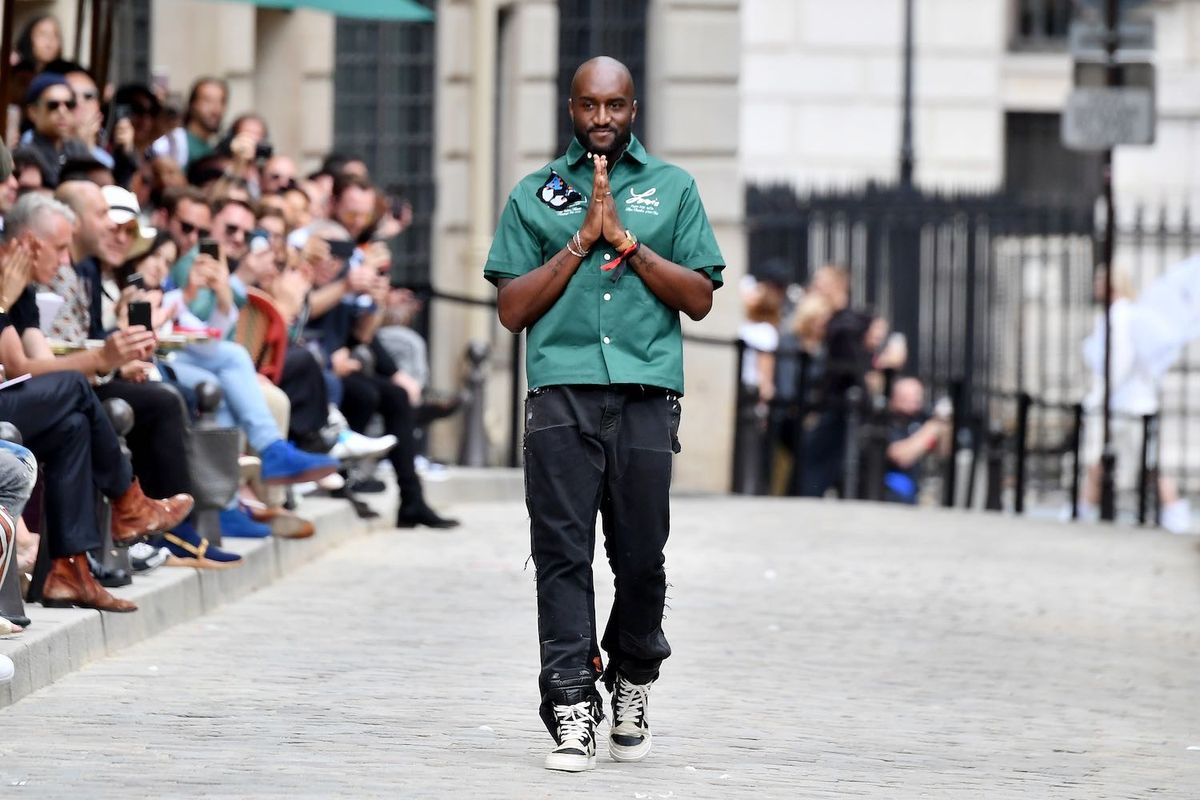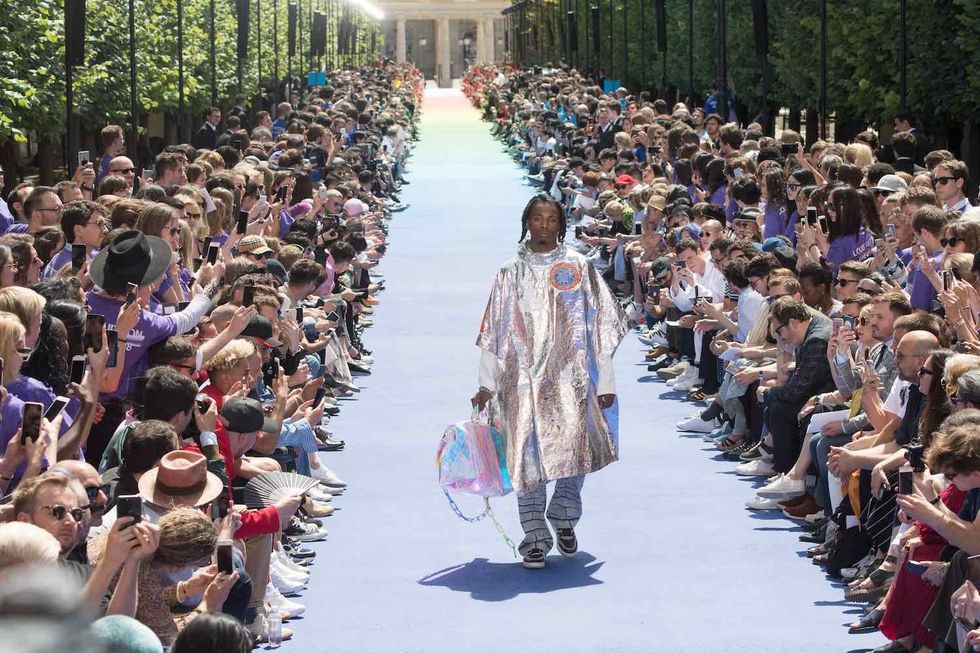
How Virgil Abloh Shaped The Future Of Rap Fashion
Photo Credit: Dominique Charriau/WireImage
To continue reading
Create a free account or sign in to unlock more free articles.
By continuing, you agree to the Terms of Service and acknowledge our Privacy Policy
Register
The content is free, but you must be subscribed to Okayplayer to continue reading.
THANK YOU FOR SUBSCRIBING
Join our newsletter family to stay tapped into the latest in Hip Hop culture!
Login
To continue reading login to your account.
Forgot your password?
Please enter the email address you use for your account so we can send you a link to reset your password:

The fashion industry has had a long-standing connection to music through various genres, especially hip-hop. The 1970s marked the evolution of hip-hop and its marriage to fashion; by the '80s and '90s, artists like Run-DMC and LL COOL J forged their own path not only as thriving hip-hop stars but trendsetters, too. Fashion brands like Adidas and Kangol became ingrained in the make-up of hip-hop fashion thanks to Run-DMC and LL, resulting in fans adapting the same wardrobes as the rappers they looked up to: classic Adidas sneakers, Kangol hats, track suits, and gold chains. But it wasn't just rappers bringing hip-hop and fashion together — so were fashion designers. Harlem's Dapper Dan took the union between the two even further with his superior knockoffs of luxury fashion brands like Gucci, Louis Vuitton, Fendi, and MCM, which led to him having a star-studded clientele that included everyone from LL to Mike Tyson. Fast-forward to the 2010s, and another fashion designer would expand on the blueprint Dapper Dan left and become an undeniable influence on modern rap fashion — the late Virgil Abloh.
Abloh was no stranger to the worlds of music and fashion, and found a number of ways to bring both together throughout his career. Abloh's introduction, for most, came through his collaborative partnership and longtime friendship with Kanye West, with the two meeting while Abloh interned at Fendi in 2009 after graduating from college. It was also during this internship that Abloh caught the attention of Louis Vuitton CEO Michael Burke, Fendi's then-chief executive.
"I was really impressed with how they [Abloh and Kanye West] brought a whole new vibe to the studio and were disruptive in the best way," Burke said in a 2018 interview with the New York Times. "Virgil could create a metaphor and a new vocabulary to describe something as old school as Fendi. I have been following his career ever since." After his time at Fendi, Abloh opened RSVP Gallery with streetwear designer (and former G.O.O.D. Music executive) Don C in their hometown of Chicago. The store housed a variety of luxury brands juxtaposed with a minimalistic layout, exposed brick walls, and glaring green neon lights, later adapting the tagline "neon and nonsense."
In 2010, West enlisted Abloh as the creative director of his creative agency, Donda. Under this position, Abloh oversaw art direction for various critically-acclaimed albums including West's My Beautiful Dark Twisted Fantasy, Big Sean’s Finally Famous, Kid Cudi’s WZRD, Pusha T’s My Name Is My Name, and, most notably, West and JAY-Z's monumental Watch the Throne. The latter album's artwork — designed by Givenchy's then-creative director Riccardo Tisci — resulted in Abloh's first Grammy nomination for Best Recording Package.
Two years after his appointment at Donda, Abloh launched his first brand, Pyrex Vision, centering the brand and its designs around youth culture and referencing the tempered glass used in drug culture. Pyrex was a testament to Abloh’s wheelhouse: the ability to transform basic tees and flannels into pieces worth the chatter and hype (something of a spiritual successor to Dapper Dan's luxury brand knockoff practice, Abloh's collection found him slapping his logo on Champion clothing items and old Ralph Lauren shirts) while also being able to upsell garments at upwards of $500. Some of the pieces were donned by Kanye West, A$AP Rocky (as well as other A$AP Mob members), JAY-Z, Kendrick Lamar and others, foreshadowing Abloh's impact on rap fashion. Abloh also had a hand in Been Trill, a streetwear brand he founded with fellow creatives Matthew Williams, Heron Preston, Justin Saunders, and YWP, around the same time. Both of these had a hand in the goth streetwear trend that came about in 2013, with its influence still felt in the fashion choices of contemporary rap figures like Playboi Carti and Travis Scott.
But it was Abloh's next venture, the haute streetwear brand Off-White, that truly took over rap fashion. Although it initially seemed to be a complete offshoot of Pyrex — from the athletic block letters to the screen-printed t-shirts, flannels, and hoodies — Off-White was different in that the clothes were all original patterns and made in Italy. Intermingling streetwear and high fashion, the brand kicked off with its now well-known black and white diagonal stripes design, Abloh transforming a pattern that one would see on crosswalks into one of modern fashion's most recognizable designs.
"...even if the general population doesn’t recognize those diagonal stripes as Abloh's, if his followers do, then he’s succeeded," Cameron Wolf wrote in the Complex article, "How Virgil Abloh Turned Diagonal Lines Into a Brand." "Imagine hundreds of thousands of Off-White fans seeing diagonal lines all the time and automatically thinking of Abloh’s label. That’s extremely powerful because it can make the brand seem larger than it actually is."
Off-White became yet another favorite among rappers, with West, JAY, Drake, Scott, and Future wearing the brand early on. By the late 2010s, Off-White had become a fixture in rap: 21 Savage modeled pieces from the brand's 2016 Fall/Winter collection; rappers like Gunna and Lil Uzi Vert name-dropped it in songs (Abloh also created the cover art for Vert's Luv Is Rage 2 album, which includes Off-White's trademark diagonal line design); and rappers like Offset and Playboi Carti modeled pieces from the brand's 2019 Fall/Winter Paris show. Now, Off-White was being worn and acknowledged alongside the luxury brands rappers often name drop: Versace, Givenchy, Gucci, and Louis Vuitton, the latter of which would gain even more popularity in rap when Abloh became its Creative Director of Menswear in 2018.
Making history as the first African-American to hold the position since Vuitton's inception in 1854, Abloh challenged the landscape of fashion, bringing his streetwear roots to the luxury brand in a way that felt divinely ordained. Where other luxury brands tried to adapt remnants of Black culture (and rap culture) to their runways, Abloh's marriage of the two felt organic, as he brought in some of rap's biggest stars to be the face of his collections and runway shows.

"Walking the Louis Vuitton show was monumental," Carti said in an interview with GQ, referring to being a part of Abloh's first Vuitton men's show in Paris in 2018. "It was pure happiness, and it was historical for both me and Virgil. As I walked down the runway, it wasn't that hard for me, because it's a lifestyle that I live every day, and people like Virgil know exactly what we're doing."
To celebrate his legacy amid his passing, Vuitton followed through with Abloh’s plans to show his runway collection during Art Basel in Miami. The show, which took place Tuesday, was a reiteration of his collection shown at Paris Fashion Week, that included some never-before-seen looks, an a larger-than-life monument erected in Abloh's honor. The show not only encapsulated Abloh's impact as a designer, but as an integral connection to rap and fashion, as artists like Quavo, Offset, and Kid Cudi took to the runway to model the collection, while artists like West, Rocky, Pharrell, 21 Savage sat in the front row.
Through his career, Abloh transformed modern rap fashion, using his relationships with rappers to both define — and redefine — the fashion of the genre and high-end luxury clothing. Even in his physical absence, the spirit and immeasurable impact he had will permeate fashion and music forever, providing the next blueprint for a successor to do the same.
—
Mikeisha Daché Vaughn is a culture writer based in Columbus, Ohio. Her work is mostly culture-based, but the ways in which her writing intersects with music and fashion is her Achilles heel. She has also written for Complex, Essence, and Teen Vogue, among others.